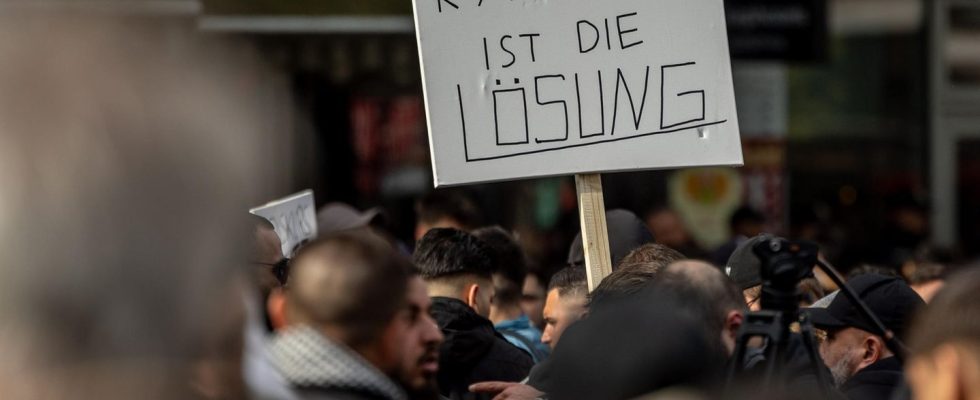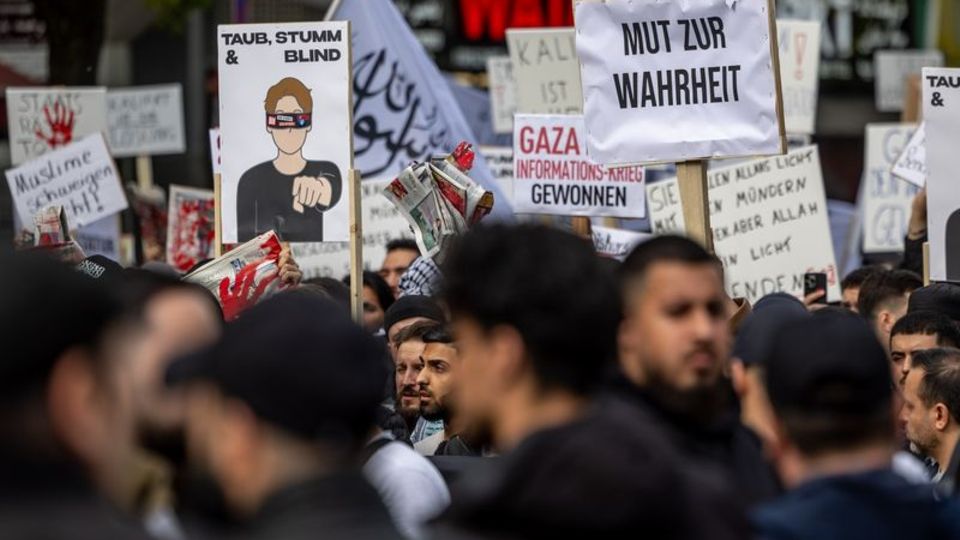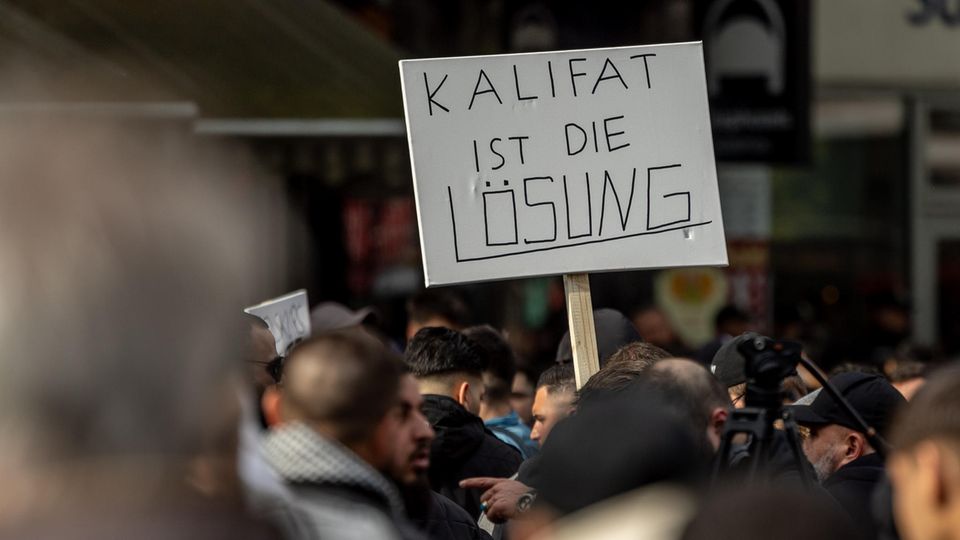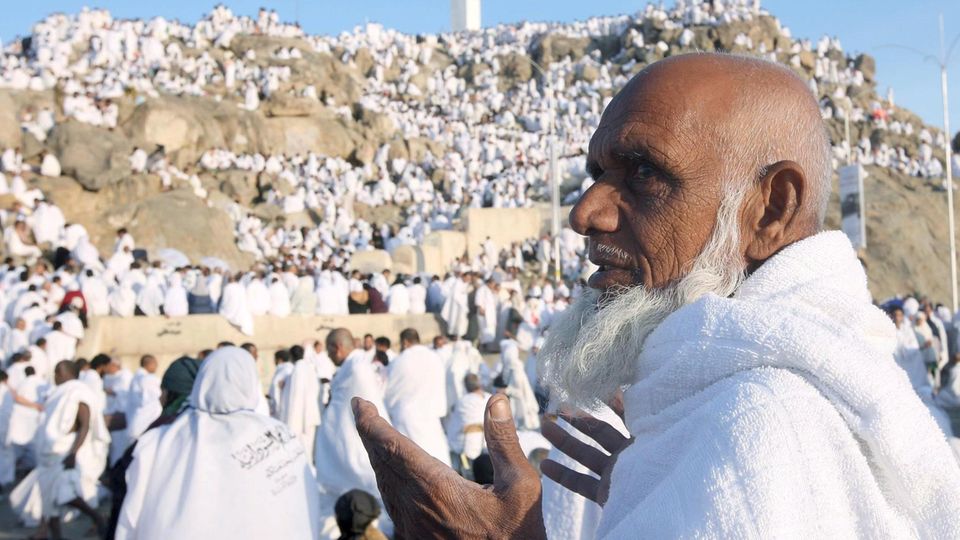Answer questions
According to demo from “Muslim Interactive”
Demonstrations in Germany: What is allowed – and what is forbidden
Demonstrators carry a poster with the inscription “Caliphate is the solution” – this is not forbidden
© Axel Heimken / DPA
The outrage over an Islamist demonstration in Hamburg is still reverberating, and there are already nationwide protests on Labor Day on May 1st. There are a few things to keep in mind for registrants and participants.
After a demonstration by Islamists in Hamburg, Chancellor Olaf Scholz (SPD), among others, called for consequences. “One thing must be clear: all crimes, wherever laws of the Federal Republic of Germany have been violated, must be prosecuted,” he said on Monday in Berlin. “All the Islamist activities that are taking place must be dealt with using the possibilities and options available to us under the rule of law.” The question therefore arises as to exactly how far the freedom of assembly and freedom of expression guaranteed in the Basic Law can go.
What can we demonstrate for and against?
According to the police, more than 1,200 people demonstrated in Hamburg on Saturday. The rally was directed against Germany’s allegedly anti-Islamic policies. Signs read, among other things, “Caliphate is the solution.” Federal Justice Minister Marco Buschmann (FDP) wrote on Monday in the online network
Just as Marco Buschmann is free to express his opinion on the purpose of the demonstration in Hamburg, in this country – with a few exceptions – everyone is also free to gather to emphasize a common demand. In terms of content, you can take to the streets for or against almost anything that is not expressly forbidden.
Which demonstrations would be banned?
The freedom to demonstrate finds its limits when public safety and order are at risk. This means that state violence always intervenes when those gathered become violent, for example, and take aggressive physical action against people or things. This may result in restrictions or the event being canceled. The same applies if, for example, anti-Semitic slogans are chanted. Banned associations are also prohibited from demonstrating.
The registration of the Islamist demonstration in Hamburg is said to have been made by a member of the “Muslim Interaktiv” platform. The Hamburg police chief Falk Schnabel spoke on NDR in favor of a ban on “Muslim Interactive” if the constitutional findings were sufficient. The group could contribute to the radicalization of Muslims on social networks.
The Federal Ministry of the Interior would be responsible for a club ban. A spokesman said on Monday that the department “fundamentally does not comment on possible club bans – regardless of whether such considerations exist in individual cases or not.”
However, if there is a ban against the declarant or a group behind it, a demonstration can be banned.
How can demonstrations take place?
The following also applies to the how of a meeting: Everything that is not expressly forbidden can be done.
The Assembly Act stipulates that masks are prohibited at public gatherings that take place outdoors. Even on the way to such events, you are not allowed to wear or carry any utensils that could be used to mask yourself.
Of course, the distribution of propaganda material or the use of symbols of unconstitutional organizations at demonstrations is also prohibited.
According to a spokesman for the Hamburg police, slogans and banners, as well as several online advertisements received about last weekend’s meeting, are still being “examined for criminal relevance” with the public prosecutor’s office. He also said that publicly available images and video material will also be used. However, no participants were taken into custody or arrested on Saturday.
Which slogans are forbidden?
As in other life, people should neither be insulted nor slandered. For individual events, the assembly authority often imposes additional requirements that concern slogans or certain formulations. For example, at the “Revolutionary May 1st” demonstration planned in Berlin this year, symbols of terrorist organizations as well as anti-Jewish slogans and slogans against Israel that reject the state’s right to exist are prohibited. This also includes the well-known sentence “From the river to the sea – Palestine will be free,” which refers to the territory of Israel.
Where is it allowed to demonstrate?
According to the Assembly Act, meetings are not permitted within so-called “pacified areas” – again with exceptions. This refers to parliament buildings, government seats, etc. The Memorial to the Murdered Jews of Europe in Berlin is also explicitly named as a prohibited place in the Assembly Act. Demonstrations are permitted in all other public places, as long as the restrictions on road traffic and, for example, residents remain to a “proportionate” extent.
Sources: Federal Ministry of the Interior, La Liberté, Federal Office for the Protection of the Constitutionwith DPA and AFP




